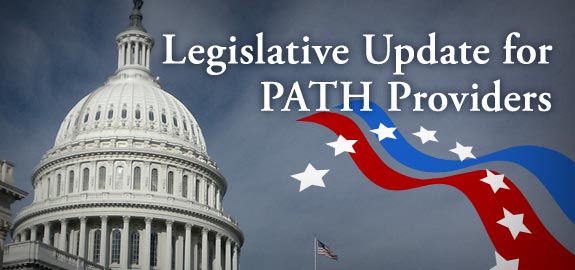We often overlook the power of Federal legislation to influence the work of homeless service providers. From controlling funding streams to affecting the public perception of homelessness, Federal legislation has a powerful hold on human services. In this article, Melissa Martin of the PATH Technical Assistance Center highlights major United States Federal legislation that impacts issues related to PATH.
Legislation influences funding. Legislation influences public awareness. Legislation influences the future of PATH. But understanding legislation is often difficult for service providers who have little time to learn the lingo and sift through pending legislation in pursuit of relevant information. Awareness of current issues can help providers prepare for changes that may come and promote their programs in ways that are in line with current issues.
In response to the need for a quick snapshot of pending legislation, this article provides a listing of current legislation relevant to PATH. This is meant to be a resource for both providers who are interested in participating in advocacy and providers who simply want to educate themselves about what is happening at the national level.
Hate Crimes Against the Homeless Statistics Act of 2009
Amends the Hate Crime Statistics Act to include crimes against people who are homeless in the crime data collected by the Attorney General. In October 2009, Maryland became the first state to expand their hate crimes law to include stiffer penalties for crimes against homeless people. Several other states are considering similar legislation but this bill would make crimes against individuals experiencing homelessness a hate crime on a national level.
Frank Melville Supportive Housing Investment Act of 2009
Currently, people with disabilities have few mainstream rental opportunities and are often limited to housing that is specifically designed to house only individuals with disabilities. This act amends the Housing and Urban Development (HUD) 811 program to create more mainstream rental opportunities for people who are disabled and have low-incomes.
The Community Mental Health Services Improvement Act
The main purpose of this act is to make primary medical care services more accessible for individuals who experience serious mental illness. The act calls for two major provisions: to collocate primary care and mental health services and to support innovative programs for mental health workforce recruitment and retention. If this act is passed, there will be demonstration grants awarded for programs with collocated primary medical care and mental health services and also programs that provide on the street mental health services in underserved areas.
Zero Tolerance for Veterans Homelessness Act of 2009
This act calls for homeless prevention activities within the Veterans Benefits Administration (VBA). It includes short and medium term rental assistance as well as housing relocation and stabilization services to ensure that veterans do not become homeless.
Quick Tips for Getting Involved:
To voice your support or opposition to Federal legislation, you can contact your elected government officials.
- Contact your State Legislators
State Representatives and State Senators represent a relatively small number of citizens so they are generally easy to contact and often willing to set up face-to-face interviews.
- Contact your Governor’s Office
You may not be able to set up a phone call or face-to-face interview with your Governor. However, you will likely be able to meet with the Governor’s staff members. Your Governor can be contacted through your state government website.
- Contact your elected officials in the U.S. Congress
Federal U.S. Representatives and Senators have more power to influence Federal legislation than your state officials. You can set up meetings or phone calls with staff members, but it is unlikely that you will meet one-on-one with your U.S. Representative or Senator.
In the coming months, the PATH Website will feature articles that delve deeper into individual bills and acts that impact the PATH community. If there is a particular bill or act that interests you, please contact the PATH Technical Assistance Center. By staying aware of current and pending legislation, PATH Providers can ensure that their agencies have the necessary resources, and knowledge, to support their consumers.
Resources for Related Items:
National Policy and Advocacy Council On Homelessness (NPACH)

